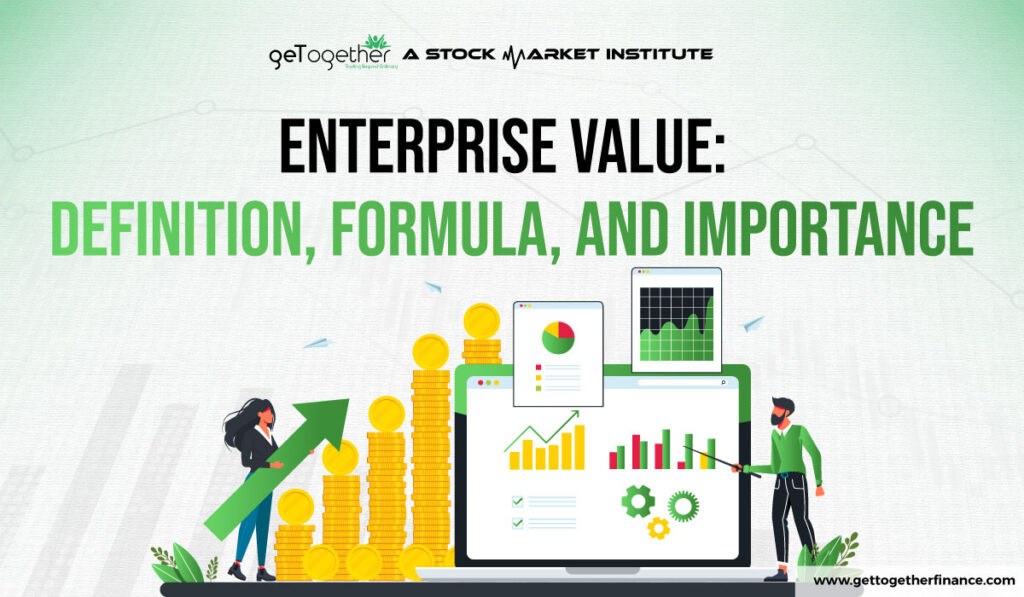Enterprise Value: Definition, Formula, and Importance
- June 27, 2024
- 1828 Views
- by Manaswi Agarwal


Enterprise value is to understand finance of different companies and compare their value for investment purposes. This is one of the vital concepts in corporate valuation as it guides investors about a company’s finances serving as a foundation of several mergers and acquisitions. This blog will thoroughly guide you about the fundamentals and concepts of enterprise value and what it could mean to investors.
What does Enterprise Value mean?

Enterprise value is used to calculate a company’s total value that is used as an alternative to market capitalization. A firm’s enterprise value is calculated when the value of business is ascertained by using unlevered free cash flow. Enterprise-value of a firm is also known as the firm value or asset value as it represents the value of assets of the business. In simple terms, enterprise value explains a firm’s valuation and its worth in terms of purchase price.
Enterprise Value Formula

The formula to calculate enterprise value is:
Enterprise Value = Market Capitalization + Total Debt – Cash
Let us understand about the components of the formula:
Market Capitalization
Market capitalization refers to the current market value of the company’s shares that are held by the shareholders. Market cap represents the total number of shares multiplied by the current share market price. Market cap determines how big the size of the company, higher the market cap represents higher valuation of the company.
Total Debt
Debt represents the amount that a company owes to its lenders or creditors. In other words, debt represents the liabilities of the company which can be short term as well as long term. A higher liability indicates that a company is not able to meet its debt obligations.
Cash or Cash Equivalents
Cash or cash equivalents represent the liquid assets like paper currency, savings and checking accounts. It does not include the capital assets of a company like stocks. Net debt of a company is ascertained when by subtracting cash from company’s total debt because liquid assets are used to pay off the debt obligation as and when required.
Also Read: Net Asset Value
Importance of Enterprise Value

Enterprise value determines a company’s overall valuation through which their capital structure is defined and market capitalization can be differentiated.
Valuation Metric
Enterprise value is used by investors as a valuation metric with the help of which they can compare companies considering mergers and acquisitions. It helps them to determine overall company’s value while including debt and excluding cash. EV is a more comprehensive measure than market capitalization to calculate the true value of a company as it considers debt and excludes cash or cash equivalents.
Effective Comparison
Enterprise value helps investors to compare companies having different capital structures. EV recognizes the debt and liquidity available in companies based on which investors can differentiate between companies that have the same market capitalization. They can compare if the company is able to meet its debt obligations or not to refine their investments.
Mergers and Acquisitions
EV is one handy tool through which financial ratios can be calculated which are efficient to compare the value of different companies. Mergers and acquisitions can ascertain the true value of a company through EV so that they can get a fair price for the company.
Tracks Value over Time
EV defines the actual value of a company and tracking EV regularly is one effective way to analyze a company’s financial performance and the overall market environment. If EV increases, it indicates that the company is performing well and vice versa.
Risk Management
Enterprise-value is an essential tool for companies to manage their risks as it tracks the value of a company over time and helps businesses assess the risk of an investment, acquisition or merger. It is measured as a tool to predict potential risks of the business which can be rectified by taking timely actions.
Limitations of Enterprise Value

Each metric has some limitations as the calculations and estimates in the real world cannot be accurate. Here lie the shortcomings of EV as a measurement:
Market Fluctuations
The prices of the stocks fluctuates frequently which result in the fluctuation of market capitalization of the company. This leads to wrong identification of EV of the company.
Hard to Achieve Accuracy
Enterprise value is difficult to calculate accurately because it only accounts for company shares which can be tricky to ascertain as the market price of company’s shares does not reflect its actual value.
Lacks Several Factors
While calculating enterprise value, all the factors are not taken into account such as intangible assets like brand value or intellectual property. Moreover, this value does not take future growth potential into account like a company might have great financials but lacks growth potential in future.
Not a Perfect Measure
Enterprise value is not a perfect metric to assess a company’s true value as it only relies on the market price of a company’s shares while neglecting other factors like investors’ sentiments or market volatility which can majorly affect a firm’s valuation.
Industry Comparison
You can assess a company’s valuation or compare two companies based on their enterprise-value but it’s not easy to compare the two companies that belong to different industries.
Conclusion
Business entities and institutions need to ascertain several financial metrics like cash flows, debt level, and asset replacement to achieve more accurate valuation. Enterprise value is one essential metric for comparing companies that work in the same industry to find accurate value of the company to invest in and for the purpose of mergers and acquisitions.
FAQs
What do you mean by Enterprise Value or EV?
Enterprise Value of EV is a measurement technique to ascertain the actual value of a company by taking current market share price, debt and cash into account.
What is the formula for EV?
In order to calculate Enterprise-Value cash or cash equivalents is deducted from total debt which is added to the market capitalization. EV = Market Capitalization + Total Debt – Cash
How to improve Enterprise Valuation?
A company should focus on reducing its debt obligation by growing sales and reducing costs to improve the enterprise valuation.
What is the Advantage of Enterprise Value?
Enterprise-value reveals the actual worth of a business to compare firms having different capital structures as it does not affect the value of a firm. It is an effective method to track value of the business over time which helps investors to analyze to determine the company’s valuation.



 Instagram
Instagram 
